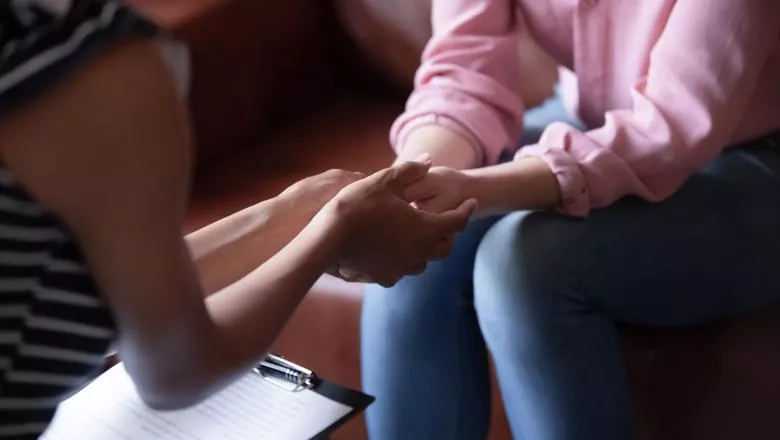
Laura Fischer
Founder & CEO, Traumascapes
- Consultant & PhD Student
Biography
Laura is a Survivor Researcher, Lecturer, Artist, Consultant, and the Founder & CEO of Traumascapes, a survivor-led organisation dedicated to changing the ecosystem of trauma and creating new horizons for survivors through art and science.
Her research focuses on the embodied experience of childhood trauma and novel body-based interventions. Her art practice explores the reclaiming and rewriting of the sociocultural narrative of trauma on survivors’ own terms. Her consultancy spans trauma-informed and trauma-sensitive practice; survivor research and lived experience involvement; and arts for health.
She is Visiting Lecturer on the MASc Creative Health at UCL and the MSc Creative Arts and Mental Health at Queen Mary University of London; Patient and Community Involvement Lead for the NIHR ARC National Priorities Programme – Mental Health Implementation Network; and Editorial Advisory Board Member of The Lancet Psychiatry.
Laura trained as a dancer with the Ballet de la Côte in Switzerland and studied arts at Central Saint Martins; mental health sciences at Queen Mary University of London; and traumatic stress at the Justice Resource Institute. She was also awarded Improvement Leader Fellow by NIHR CLAHRC NWL for the development of her Trauma-Focused Movement Language (TFML), a survivor-led and body-based approach to healing trauma. She has worked with many universities, NHS Trusts, NHS England, the NIHR, Public Health England, Wellcome, and others.
At King's College London, Laura is currently working with Angela Sweeney to develop a small survivor-led study based in the ESRC Centre for Society and Mental Health and SURE; and she is conducting a PhD in Psychology on the embodied experience of childhood trauma and its impact on survivors’ relationships with themselves and others, funded by the LISS DTP.
To find out more, see Laura Fischer: The Art and Science of Transforming Trauma in The Lancet Psychiatry.
Research Interests
- Childhood trauma and complex trauma: neurobiological underpinnings and subjective experiences
- Creative, body-based, and survivor-led approaches to healing trauma
- Trauma-informed and trauma-sensitive practice
- Survivor research and activism
- Arts-based research methods and arts for health
Teaching
- Seminar Lead in Women’s Mental Health
Expertise and Public Engagement
Laura actively explores ways of bridging research and public discourse. Importantly, she curates exhibitions where art, science, and activism intersect and she uses her art practice to open conversations and shift sociocultural narratives. She also translates research data into creative outputs and regularly facilitates workshops, gives talks, speaks on podcasts, and writes blogs, articles, and social media posts.
Laura has spoken widely and exhibited internationally, including at the V&A, Whitechapel Gallery, Royal Albert Hall, and BFI, and some of her artwork is in the Central Saint Martins Museum Collection.
Key Publications
Fischer & Kneebone (forthcoming). ‘Embodying mental health: making arts intrinsic to training and practice.’
Dykxhoorn, Fischer, et al. (2022). ‘Conceptualising Public Mental Health: Development of a conceptual framework for public mental health,’ BMC Public Health.
Chevous, Fischer, Perôt, Sweeney (2020). ‘Safe, Seen, Supported: How to reach and help children and young people experiencing abuse in their household’, VAMHN.
Duncan et al. On behalf of the NIHR SPHR Public Mental Health Programme. (2020). ‘Delivery of community centred public mental health interventions in diverse areas in England: a mapping study protocol’, BMJ Open.
Fischer, L. (2019). ‘Trauma-Focused Movement Language’, The Lancet Psychiatry, 6(12), pp.991-993.
Fischer, L. (2019). ‘Violence and Trauma: A societal reality we are all responsible for’, in Perriman, B. Doorways. London: House Sparrow Press, pp.96-103.
Matthews, Green, Myron, French, Barber, Dionne, Sandra, Fischer (2019). ‘Connections: the power of learning together to im- prove healthcare in the UK,’ Organizational Behaviour in Healthcare. London: Palgrave Macmillan, pp.129-167.
Research

Service User Research Enterprise
SURE (the Service User Research Enterprise) is a unique academic research group comprised predominantly of neurodivergent researchers and survivor researchers with direct experience of trauma violence and abuse, mental distress, and/or using (or refusing) mental health services. SURE offers Advisory Sessions on patient and public involvement (PPI) to researchers in Mental Health and Psychological Sciences (IoPPN) and the Centre for Society and Mental Health (KCL). Please visit our booking page to find out more.

King's Women's Mental Health
King's Women's Mental Health (KWMH) conducts pioneering research to improve women's mental health

Population Mental Health Consortium
UK network to boost the role of research and the use of data to improve population health focused on children and young people, suicide and self-harm prevention and multiple long-term conditions.

Cross-Cutting Platform 4: Training and Capacity Building
Develop an interdisciplinary training programmeto support the development of the next generation of leaders in population mental health.
Project status: Ongoing
News
Survivor-led report highlights urgent need to recognise and help children and young people at risk of abuse during COVID-19 and beyond
As children go back to school in England today, Monday 8th March, a new a survivor-led report is being launched by Survivors’ Voices and King’s College...

Features
Announcing a New Lancet Psychiatry Commission on Lived Experience in Mental Health Research: Come and join us
In this blog those involved in launching a new commission by The Lancet Psychiatry on lived experience in mental health research discuss the need to reflect...

Research

Service User Research Enterprise
SURE (the Service User Research Enterprise) is a unique academic research group comprised predominantly of neurodivergent researchers and survivor researchers with direct experience of trauma violence and abuse, mental distress, and/or using (or refusing) mental health services. SURE offers Advisory Sessions on patient and public involvement (PPI) to researchers in Mental Health and Psychological Sciences (IoPPN) and the Centre for Society and Mental Health (KCL). Please visit our booking page to find out more.

King's Women's Mental Health
King's Women's Mental Health (KWMH) conducts pioneering research to improve women's mental health

Population Mental Health Consortium
UK network to boost the role of research and the use of data to improve population health focused on children and young people, suicide and self-harm prevention and multiple long-term conditions.

Cross-Cutting Platform 4: Training and Capacity Building
Develop an interdisciplinary training programmeto support the development of the next generation of leaders in population mental health.
Project status: Ongoing
News
Survivor-led report highlights urgent need to recognise and help children and young people at risk of abuse during COVID-19 and beyond
As children go back to school in England today, Monday 8th March, a new a survivor-led report is being launched by Survivors’ Voices and King’s College...

Features
Announcing a New Lancet Psychiatry Commission on Lived Experience in Mental Health Research: Come and join us
In this blog those involved in launching a new commission by The Lancet Psychiatry on lived experience in mental health research discuss the need to reflect...

